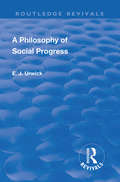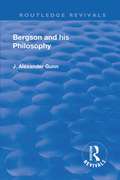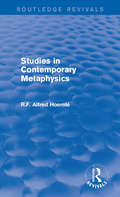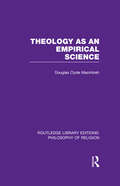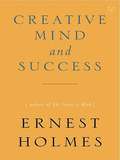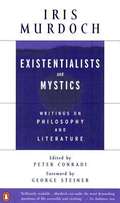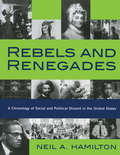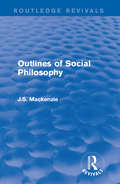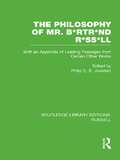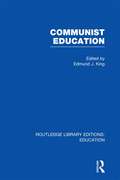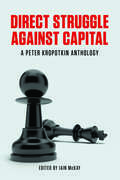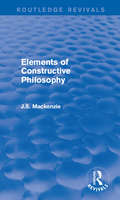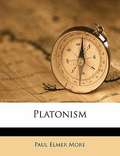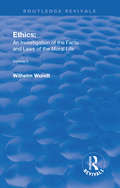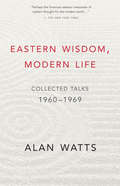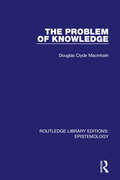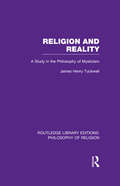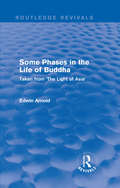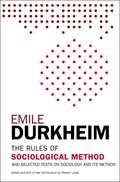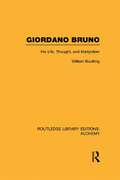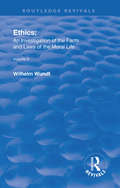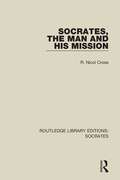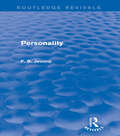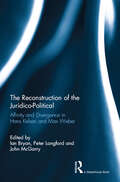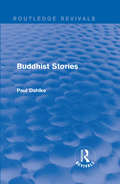- Table View
- List View
Revival: 2nd Edition (Routledge Revivals)
by Edward Johns UrwickThis book was originally written with a double purpose; The first reason was to introduce students to a conception of a social philosophy which should be definitely linked to modern sociology, and not to be treated as a mere outgrowthof the older physical philosophy. The second reason, was to establish a new position in regard to the philosophical conception of social change – a position in opposition to that usually assumed both by the sociologist and by the philosopher.
Revival: Bergson and His Philosophy (Routledge Revivals)
by J. Alexander GunnThe stir caused in the civilised world by the writings of Bergson, particularly during the past decade, is evidenced by the volume of the stream of exposition and comment which has flowed and is still flowing. If the French were to be tempted to set up, after the German manner, a Bergson-Archiv they would be in no embarrassment for material, as the Appendix to this book – limited though it wisely is – will show. Mr. Gunn, undaunted by all this, makes a further, useful contribution in his unassuming but workmanlike and well-documented account of the ideas of the distinguished French thinker. It is designed to serve as an introduction to Bergson’s philosophy for those who are making their first approach to it, and as such it can be commended.
Studies in Contemporary Metaphysics (Routledge Revivals)
by R.F. Alfred HoernléOriginally published in 1920, this title wrestles with the critical conflict in modern philosophy of whether philosophers should employ pure reason in a world of abstracts or, rather, should rely upon experience and rationality to examine the actual world. Hoernlé argues for the latter and emphasises the importance of metaphysics in the intellectual quest for knowing reality. This title is ideal for students of philosophy and provides insightful background into the diverging philosophical views of the early 20th century.
Theology as an Empirical Science (Routledge Library Editions: Philosophy of Religion)
by Douglas Clyde MacintoshInvestigating the question ‘can theology, description of the divine reality, be made truly scientific?’, this book addresses logic and human knowledge alongside experimental religion. An important philosophic work by a prolific theologian also known for his later court case regarding conscientious objection, this book describes how it is possible to relate theological theory with religious experience of the divine the way that the sciences relate to human acquaintance with things and people in social experience.
Creative Mind and Success
by Ernest HolmesUse the Practical Power of Creative Thought in Your Life Among Ernest Holmes’s earliest works, Creative Mind and Success is the sage’s consummate guide to the power of positive thought in finance and the workplace, and as a motivating force in living out one’s dreams. "Very deep. ” -Barry Zito, Oakland A’s Pitcher "As we look back, we can take pride that the writings and persona of Dr. Ernest Holmes put him in the forefront of the inspired spiritual leaders of the twentieth century. -Catherine Ponder, author of The Dynamite Laws of Prosperity .
Existentialists and Mystics
by Iris MurdochBest known as the author of twenty-six novels, Iris Murdoch has also made significant contributions to the fields of ethics and aesthetics. Collected here for the first time in one volume are her most influential literary and philosophical essays. Tracing Murdoch's journey to a modern Platonism, this volume includes incisive evaluations of the thought and writings of T. S. Eliot, Jean-Paul Sartre, Albert Camus, Simone de Beauvior, and Elias Canetti, as well as key texts on the continuing importance of the sublime, on the concept of love, and the role great literature can play in curing the ills of philosophy. Existentialists and Mystics not only illuminates the mysticism and intellectual underpinnings of Murdoch's novels, but confirms her major contributions to twentieth-century thought.
Rebels and Renegades: A Chronology of Social and Political Dissent in the United States
by Neil A. HamiltonRebels and Renegades examines 350 years of history through the eyes of the uncompromising. Presented in nine clearly written chronological chapters, this comprehensive reference covers the major events and personalities in the history of extremism in the U.S. Besides chronicling the event itself, entries, ranging from 500 to 1000 words, include background information and historic effects. In addition to the chronology, sidebars highlight historical, biographical, cultural, and ethical aspects of the story, tying the past to the present. Topics include the influence of radical idea on the mainstream, the role of violence in radicalism, and the evolving relationship between radicals and the media. An extensive appendix of excerpts, transcripts, and full source documents round out the work. To see the Introduction, a list of detailed contents, a generous selection of sample pages, and more, visit the Rebels and Renegades website.
Outlines of Social Philosophy (Routledge Revivals)
by J.S. MackenzieSocial philosophy can be considered the study of what unifies mankind and the study of values and ideals and what their meaning and worth is to human existence. Originally published in 1918, Mackenzie’s study provides a basic outline of what he believes is the origin of social philosophy whilst placing a focus on social order; dividing his work into the foundations of social order, national order and world order. This title will be of interest to students of Philosophy, Sociology and Anthropology
The Philosophy of Mr. B*rtr*nd R*ss*ll: With an Appendix of Leading Passages from Certain Other Works. A Skit. (Routledge Library Editions: Russell)
by Philip E. B. JourdainThis skit of Bertrand Russell’s philosophy was originally published in 1918 by Russell’s correspondent friend Jourdain. The introduction explains that the contents purport to be lost papers written by Mr. B*rtr*nd R*ss*ll, a contemporary of Bertrand Russell. This politically humorous volume from the early 20th Century parodies the writing style of Russell as well as his theories.
Communist Education (Routledge Library Editions: Education)
by Len Barton Martin LawnDevelopments and trends in Communist education are traced in this authoritative survey by specialists. Eight chapters deal with particular aspects: ideology, psychology, the selective process, the roles of teachers and parents, polytechnical education, the universities and professional institutes. Three chapters survey the former East Germany, Poland and China as special case-studies. A concluding chapter examines common ground between Communist and other systems.
Direct Struggle Against Capital
by Iain Mckay Peter KropotkinThis is the most extensive collection of Peter Kropotkin's writings available in English. Over half the selections have been translated for the first time or salvaged from long-out-of-print pamphlets and newspapers. Both an introduction to classic texts and a recontextualization of Kropotkin from saintly philosopher to dangerous revolutionary, Direct Struggle Against Capital includes a historical introduction, biographical sketch, glossary, bibliography, and index.Peter Kropotkin was one of anarchism's most famous thinkers. His classic works include The Conquest of Bread and Mutual Aid: A Factor of Evolution.Iain McKay has edited An Anarchist FAQ (volumes one and two) and Property Is Theft: A Pierre-Joseph Proudhon Anthology.
Elements of Constructive Philosophy (Routledge Revivals)
by J.S. MackenzieJ.S. Mackenzie surveys Western philosophy from Socrates to the New Realists in an uncomplicated and approachable style. Originally published in 1917, this text serves as a useful introduction to philosophy and well-summarises the key theories of great philosophers throughout the centuries and their bearing on early twentieth-century thought. It is ideal for students of Philosophy, both for beginners and the more advanced.
Platonism
by Paul Elmer MoreThough this book goes out under the rather presumptuous title of Platonism, no one can be more aware than the author of the incompleteness of its argument. Almost nothing, for instance, is said of education and art and government
Revival: Volume II: Ethical Systems (Routledge Revivals)
by Wilhelm WundtThe present work aims to investigate the problems of ethics in the light of an examination of the facts of moral life.
Eastern Wisdom, Modern Life
by Alan WattsAlan Watts introduced millions of Western readers to Zen and other Eastern philosophies. But he is also recognized as a brilliant commentator on Judeo-Christian traditions, as well as a celebrity philosopher who exemplified the ideas -- and lifestyle -- of the 1960s counterculture. In this compilation of controversial lectures that Watts delivered at American universities throughout the sixties, he challenges readers to reevaluate Western culture's most hallowed constructs. Watts treads the familiar ground of interpreting Eastern traditions, but he also covers new territory, exploring the counterculture's basis in the ancient tribal and shamanic cultures of Asia, Siberia, and the Americas. In the process, he addresses some of the era's most important questions: What is the nature of reality? How does an individual's relationship to society affect this reality? Filled with Watts's playful, provocative style, the talks show the remarkable scope of a philosopher at his prime, exploring and defining the sixties counterculture as only Alan Watts could.
The Problem of Knowledge (Routledge Library Editions: Epistemology)
by Douglas Clyde MacintoshOriginally published in 1916. This book reviews the common problems of philosophy and then critiques the varied epistemological theories of the time. A theory of knowledge may be either dualistic or monistic and realistic or idealistic. Examining the resulting doctrines at the beginning, this book then goes on to consider mysticism, psychology, logic, consciousness, intellectualism and then scientific method. A fascinating insight into early Twentieth century philosophy.
Religion and Reality: A Study in the Philosophy of Mysticism (Routledge Library Editions: Philosophy of Religion)
by James Henry TuckwellThis discussion of the search for religious truth addresses a universal view of religion that can be termed ‘philosophical mysticism’ from a rational basis of experience. Originally published in 1915, this is a classic of theological thinking that investigates the fundamental nature of religion and ‘perfect’ experience.
Routledge Revivals: Taken from 'The Light of Asia' (Routledge Revivals)
by Edwin ArnoldFirst published in 1915, this book presents a dramatization of part ofthe author's The Light of Asia. The original text represents one of the first successful attempts to popularise Buddhism and its founder Gautama Buddha — presenting his life, teachings and philosophy in verse poetry. This adaptation dramatizes part of the The Light of Asia and includes staging instructions, properties required, illustrative drawings of suggested costumes, and incidental music composed specifically for the piece. This book will be of interest to students of Indian and Buddhist literature — and how this has interacted with the West — as well as students of drama.
The Rules of Sociological Method: And Selected Texts on Sociology and its Method (Contemporary Social Theory Ser.)
by Emile Durkheim Steven LukesConsidered a landmark work when it was first published in 1895, The Rules of Sociological Method represents Emile Durkheim's manifesto for sociology. He argues forcefully for the objective, scientific, and methodological underpinnings of sociology as a discipline and establishes guiding principles for future research. With a substantial new introduction by the leading Durkheim scholar Steven Lukes, the book explains and sets into context Durkheim's argument. The still-controversial debates about The Rules of Sociological Method's six chapters are examined and their relevance to present-day sociology is discussed. The edition also includes Durkheim's subsequent thoughts on method in the form of articles, debates with scholars from other disciplines, and letters. This is an essential resource for students and scholars hoping to deepen their understanding of one of the pioneering voices in modern sociology and twentieth-century social thought. Durkheim's methodology is still relevant today. With substantial notes on context, this revised edition will greatly ease the task of students and scholars studying Durkheim and will engage a new generation of readers with his rich contribution to the field.
Giordano Bruno: His Life, Thought, and Martyrdom (Routledge Library Editions: Alchemy)
by William BoultingThis comprehensive book outlines the life and works of an important revolutionary intellectual of the 16th Century. This book follows Bruno’s life and the development of his thought in the order in which he declared it. Giordano Bruno was an Italian Dominican friar, philosopher, mathematician and astronomer. He was burned at the stake after the Roman Inquisition found him guilty of heresy but his modern scientific thought and cosmology became very influential. His writings on science also showed interest in magic and alchemy and those are outlined in this book alongside what he is most remembered for - his place in the history of the relationship between science and faith.
Revival: Volume III: The Principles of Morality and the Sphere of their Validity (Routledge Revivals)
by Wilhelm WundtIt has been my object in the present work to investigate the problems of ethics in the light of an examination of the facts of moral life. One reason for this procedure is my desire to conduct the reader by the same path that I myself have followed in approaching ethical questions.
Socrates, The Man and His Mission (Routledge Library Editions: Socrates #3)
by R. Nicol CrossThis book, first published in 1914, examines the life of Socrates and his teaching, and also details the world in which he lived, the Greece of the time experiencing a breakdown of authority in religion, morality and society.
Personality (Routledge Revivals)
by F. B. JevonsFirst published in 1913, Jevons’ Personality marries the disciplines of philosophy and psychology in order to question the existence of personality and the arguments surrounding it. Intriguingly, Jevons suggests that if a person can question their own personality and existence, by extension they can also question the personality and existence of God. The book is arranged into four chapters based on a series of lectures delivered in Oxford in 1912: these discuss such areas as the relationship between science, psychology, and personality; the argument that "there are changes, but no things which change", and consequently there are changes, but no persons who change; and, the concepts of individualism and unity.
The Reconstruction of the Juridico-Political: Affinity and Divergence in Hans Kelsen and Max Weber
by Peter Langford Ian Bryan John McGarryHans Kelsen and Max Weber are conventionally understood as the original proponents of two distinct and opposed processes of concept formation generating two separate and contrasting theoretical frameworks for the study of law. The Reconstruction of the Juridico-Political: Affinity and Divergence in Hans Kelsen and Max Weber contests the conventional understanding of the theoretical relationship between Kelsen’s legal positivism and Weber’s sociology of law. Utilising the conceptual frame of the juridico-political, the contributors to this interdisciplinary volume analyse central points of affinity and divergence in the work of these two influential figures. Thus, the chapters collected in The Reconstruction of the Juridico-Political offer a comprehensive reconsideration of these affinities and divergences, through a comparison of their respective reconstruction of the notions of democracy, the State, legal rights and the character of law. From this reconsideration a more complex understanding of their theoretical relationship emerges combined with a renewed emphasis upon the continued contemporary relevance of the work of Kelsen and Weber.
Routledge Revivals: Buddhist Stories (Routledge Revivals)
by Paul DahlkeFirst published in 1913, this book presents a translation of five stories written by the the author. Each of the five stories illustrates and elucidates central concepts in Buddhist philosophy while eschewing any technical terminology. As such, this book is ideal for those seeking an accessible introduction to Buddhist philosophy and will provide a platform for further study.
